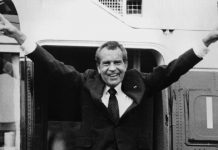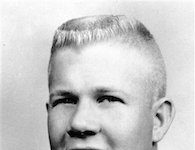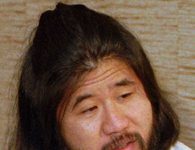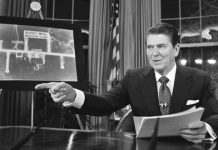On February 11, 1990, South African President Frederik Willem de Klerk freed anti-apartheid activist Nelson Mandela. Mandela had spent 27 years in prison.
Mandela Goes Free as Apartheid Falls
Nelson Mandela, as a leader in the African National Congress, an organization dedicated to protesting the South African government’s policy of apartheid, had been arrested in 1956 on treason charges, but was acquitted.
In 1961, believing that non-violent measures would not be successful, Mandela and other ANC leaders formed Umkhonto we Sizwe (MK), a militant wing of the ANC. Beginning on Dec. 16, 1961, MK, with Mandela as its commander in chief, launched bombing attacks on government targets and made plans for guerilla warfare.
Mandela was arrested in August 1962 and sentenced to five years in prison. In 1963, he was convicted a second time for sabotage. He received a life sentence on June 12, 1964, and was sent to prison on Robben Island.
On the notorious Robben Island, Mandela lived in a tiny cell, received meager rations and performed hard labor in a lime quarry. “But Robben Island became the crucible which transformed him,” writes PBS. “Through his intelligence, charm and dignified defiance, Mandela eventually bent even the most brutal prison officials to his will, assumed leadership over his jailed comrades and became the master of his own prison.”
In the 1980s, exiled ANC leader Oliver Tambo, Mandela’s former law partner, led an international movement to free Mandela. Many countries imposed sanctions on South Africa for its apartheid policies.
In 1985, President P.W. Botha offered to release Mandela, who had been moved to Pollsmoor Prison in Cape Town, on the condition that he renounced violence. Mandela refused, saying, “Prisoners cannot enter into contracts. Only free men can negotiate.”
F.W. de Klerk became president in 1989 and began to dismantle the policies of apartheid and release the ANC prisoners. On February 12, 1990, Mandela was released after 27 years in prison.
“Now is the time to intensify the struggle on all fronts,” Mandela said. “To relax our efforts now would be a mistake which generations to come will not able to forgive.”
Sources in this Story
- Nelson Mandela Foundation: Biography
- South African History Online: The Rivonia Trial and Lilliesleaf Farm
- PBS: The Long Walk of Nelson Mandela
- The New York Times: South Africa’s New Era; Mandela, Freed, Urges Step-Up In Pressure To End White Rule
- The Nobel Foundation: The Nobel Peace Prize 1993
- Apartheid Museum: Classroom Resources
- NPR: Mandela: An Audio History
Biography: Nelson Mandela
Nelson Rolihlahla Mandela was born July 18, 1918, in a village in the Transkei, the great-grandson of Ngubengcuka, the king of the Thembu people. His father, a village chief, died when Nelson was 9, and young Nelson was groomed to inherit his father’s position.
He was sent away to school and later attended Fort Hare University, where he met Oliver Tambo. After being suspended for participating in a boycott, he moved to Johannesburg and joined the African National Congress in 1942. He joined Anton Lembede in forming a movement of young Africans in the ANC that emerged as the most influential anti-apartheid movement.
After his release from prison, Mandela was elected president of the ANC at the organization’s first national conference since it was banned in 1960. Mandela continued to lobby for the complete dissolution of apartheid.
On April 27, 1994, in South Africa’s first democratic elections with universal suffrage, Mandela was elected president. He served one five-year term before retiring; he then dedicated himself to speaking engagements and charity work.
Nelson Mandela died at his home on December 5, 2013, at the age of 95.
“Nelson Mandela never wavered in his devotion to democracy, equality and learning,” writes the Nelson Mandela Foundation. “Despite terrible provocation, he has never answered racism with racism. His life has been an inspiration, in South Africa and throughout the world, to all who are oppressed and deprived, to all who are opposed to oppression and deprivation.”
Watch an interview Mandela gave to playwright Arthur Miller in December 1990.
South Africa Content
Later Developments: Nobel Prizes
Mandela and de Klerk received the 1993 Nobel Peace Prize for their work in ending apartheid. In the presentation speech, Francis Sejersted, chairman of the Norwegian Nobel Committee, said that the two men were awarded the prize because of their resolve “not to dwell on the deep wounds of the past” and to move forward to “break the vicious circle” that South Africa descended into after World War II.
“The policy of reconciliation that Nelson R. Mandela and Frederik Willem de Klerk represent provides hope not only for South Africa; it is also a shining example for the world that there are ways out of the vicious circle of violence and bitterness,” Sejersted said.
Reference: Apartheid
After winning the 1948 elections, the white Afrikaner National Party moved to consolidate its hold on power with the introduction of racially discriminatory measures known collectively as apartheid. Learn more about the history of apartheid with the Apartheid Museum’s Understanding Apartheid free workbooks for teachers and students, available in PDF.
NPR has a feature recounting South Africa’s apartheid past and evaluating the changes that have taken place 10 years after the institution’s collapse.











